The sirens did not sound at noon during the floods in 2009 and 2013, or at a time when the country was also in a state of emergency and restrictions due to the spread of Covid-19. In such situations, the Fire Department cancels the test to avoid causing panic.
Prague’s population increased by 13,148 people last year, reaching approximately 1.398 million by the end of December 2024.
According to data released by the Czech Statistical Office (CZSO), the city’s population growth was driven by both a natural increase—meaning more births than deaths—and migration.
The natural increase accounted for an additional 293 people, with 12,085 births recorded in Prague in 2024, compared to 11,792 deaths. Prague was the only region in the Czech Republic to experience population growth through natural increase last year; in every other region, there were more deaths than births.
In addition to the natural increase, migration played a significant role, contributing 12,855 people to the city’s population. A total of 62,689 people moved into Prague, while 49,834 residents left. This migration trend highlights Prague’s continued appeal as a destination for newcomers.
The capital city also saw 6,189 marriages in 2024, while 2,380 marriages ended in divorce over the same period.
On a national level, the population of the Czech Republic grew by approximately 8,900 people, reaching a total of 10.91 million.
This growth was largely attributed to foreign migration. However, the number of births in the country reached a historic low of 84,311, and the overall natural population decline was 27,900 people. The country’s population increase was primarily due to migration, which added 36,845 people.
Prague remains the second most populous region in the country, following the Central Bohemian Region, which has a population of 1.466 million. Interestingly, geolocation data from mobile operators suggests that more people actually live in Prague than official statistics indicate.
According to data from the Czech Ministry of the Interior, the population could be as high as 1.423 million, factoring in commuters who do not report daily movements or changes in residence.
Would you like us to write about your business? Find out more
Prague’s beloved short trams are set to become a rarity as the city embarks on a major tram fleet upgrade.
The recent order of 40 Škoda ForCity Plus 52T trams, with an option for 160 more, marks a significant step towards a complete generational renewal.
While these modern trams boast improved comfort and accessibility, they also spell the end of the era of classic solo cars like the Škoda 14T and the iconic T3 design.
Jan Šurovský, Prague’s transport company’s technical director for surface transport, explains that the new trams won’t come in a shorter version due to various reasons.
Instead, the need for shorter trams on less busy lines will be addressed by modernizing the existing T3 trams for night operation.
This modernization project involves purchasing 65 more facelifted cars for the existing fleet, with each tram costing around CZK 10 million.
The new Škoda ForCity Plus trams also address the long-standing issue of track wear and tear caused by older tram designs.
Unlike the 14T trams with their unique wheel design and higher axle load, the 52T features conventional swivel bogies at the edges and non-rotating bogies in the middle, offering a more sustainable solution for Prague’s track infrastructure.
One notable feature missing from the new trams is air conditioning, which was initially planned for the first series of Škoda 15T trams delivered in the last decade.
However, due to unresolved contractual issues and the lack of a clear cost-benefit analysis, adding air conditioning to these trams remains uncertain.
The first Škoda ForCity Plus 52T trams are expected to arrive in Prague within a year for testing and homologation purposes. If all goes well, passengers can expect to see them rolling on the city’s streets soon after.
This generational shift in Prague’s tram fleet means not only an upgrade in technology and passenger comfort but also a farewell to a part of the city’s identity.
While the classic trams may be fading away, they leave behind a legacy of charm and nostalgia that will continue to hold a special place in the hearts of Praguers and visitors alike.
On Wednesday 7 February 2024, a regular test of the sirens’ functionality took place throughout the Czech Republic.
On the first Wednesday of each month, at 12:00, sirens sound, emitting an uninterrupted tone test for 140 seconds.
History of the Warning System
The emergency warning system was put in place, not just in Prague, but all of Czechoslovakia (when it was still Czechoslovakia) during World War II. The sirens aim to protect citizens by ensuring that they will be notified of imminent or incurred danger.
At the time and during the Cold War, it was meant to warn citizens of activities that could endanger the lives of locals. Just little things like bombs, air raids, enemy gunfire on the streets, Nazi occupation, Russian invasions… you know the things that happen in a country when war is outside your door and not on TV.
This is the text in Czech and English:
Zkouška sirén, zkouška sirén, zkouška sirén. Za několik minut proběhne zkouška sirén. Zkouška sirén, zkouška sirén, zkouška sirén.“
„Test of sirens, test of sirens, test of sirens. Test of sirens will continue within several minutes. Test of sirens, test of sirens, test of sirens.“
Prague’s Emergency Sirens in Daily Life
Though seemingly archaic, the Czech Republic still uses these emergency sirens. The sirens go off in the event of a major disaster like an earthquake, a chemical plant accident, or other life-threatening incidents like war.
What does it sound like and when will you hear it?
The warning signal is a 140-second wailing tone. The sirens are emitted from hundreds of speakers that are scattered throughout the city.
What if you hear them at other times?
The emergency sirens can also be used to call firefighters. But in those cases, the tone will be interrupted at 25-second intervals or will last for only a minute. In rare cases like these, the signal is not meant to warn citizens at all, but to mobilize the firefighters in the area.
On February 1, 2024, the first flight of a new charter route from Prague to Abu Dhabi took off at 10:20 from Václav Havel Airport.
Operated by Smartwings with a Boeing 737 MAX, the route is for Der Touristik group, encompassing travel agencies Fischer and Exim Tours. The weekly flights to the United Arab Emirates capital will run until early May.
The UAE is a popular destination for Czech travelers, with over 100,000 passengers using the connection last year.
Der Touristik considers Abu Dhabi, known for its safety and attractions like the Sheikh Zayed Grand Mosque and entertainment parks, a valuable addition to Prague’s airport offerings.
“The United Arab Emirates has long been very popular with Czech passengers: last year more than 100,000 people used the air service between the UAE and Prague. The new connection with the country’s capital will expand the offer to another interesting destination from our airport,” said Jaroslav Filip, spokesman for Prague Air Harbour.
The flight duration will be about 7 hours.
It is not possible to buy tickets for the flight. They are available only as part of FISCHER or Exim Tours packages.
It should be noted that today direct scheduled flights between Prague and the UAE are operated by Emirates, Smartwings and flydubai.
All of them fly to Dubai. In turn, FISCHER Tours also offers charter flights to the emirate of Ras al-Khaimah. Now Abu Dhabi has been added to these destinations.
Researchers have revealed where and where not to visit if safety and peace are your top priorities, with this year’s publication of the Global Peace Index (GPI).
This 17th edition of the index reveals, depressingly, that overall world peacefulness has declined by just under half a percent, which may not seem much but fits in with a 15-year downward trend.
How is it measured?
The Institute for Economics and Peace uses both qualitative and quantitative criteria in the GPI, a whole 23 of them, and looks at 163 independent states and territories comprising 99.7 per cent of the world’s population.
Three main areas are taken into consideration: how safe and secure society is; ongoing domestic and international conflict levels; and to what extent the country in question is militarising.
Global Peace Index 2023: The average level of global peacefulness deteriorated for the ninth consecutive year, with 84 countries recording an improvement and 79 a deterioration pic.twitter.com/ZfVmUIj1hU
— IEP Global Peace Index (@GlobPeaceIndex) November 22, 2023
The Czech Republic has been ranked 12th in the Global Peace Index 2023. Despite a slight drop of five places over the past twelve months, the country still maintains its position among the most peaceful nations.
The most peaceful countries in the world 2023
- Iceland
- Denmark
- Ireland
- New Zealand
- Austria
- Singapore
- Portugal
- Slovenia
- Japan
- Switzerland
The most dangerous countries in the world 2023
- Afghanistan
- Yemen
- Syria
- South Sudan
- Democratic Republic of the Congo
- Russia
- Ukraine
- Somalia
- Sudan
- Iraq
Step aside Big Ben, Grand Central Clock, and assorted Rolex products: there’s a new chronographic monarch in town. Actually, it’s a far older timepiece dating back to 1410 on the Town Hall in Prague.
This makes it the 600-year-old, undisputed title-holder of “Coolest Clock in the History of Ever.” “Elegant, sumptuous aesthetics meets timeless timekeeping mastery,” the ad might read.
Prague’s Astronomical Clock, more properly the “Orloj”, is a stunning engineering marvel. From the outside, it looks like a color-coded, multi-layered, brightly painted clock-face of golden whorls and arcane symbolism.
Inside, it’s a brain-bustlingly convoluted mechanism of endlessly churning weights, pulleys, ropes, and gears.
As a multifunctional medieval astrolabe, it tracks “Old Czech Time” (from when the sun sets) using ancient Gothic numerals, the Sun’s intersection with zodiacal signs using Arabic numerals (1, 2, 3, etc.), and “sidereal” hours using Roman numerals (our actual, uncorrected “day” of 23 hours, 56 minutes).
It also depicts the phases of the moon, when the sun reaches its zenith above the Tropics of Cancer and Capricorn, the entire calendar year, and much more.
Every hour from 9 a.m. to 10 p.m. (except for Mondays), tourists can gawk at a procession of moving wooden figures that parade through and without the Orloj.
We’ve got four allegorical entities, Vanity, Greed, Death, and Extravagance, and “The Walk of the Apostles,” featuring all 12. We’d totally crowdfund a wrist-based version if anyone’s up to the task.
A 600-year-old art-and-engineering project
The Orloj isn’t the world’s only astronomical clock, but it tends to get the most attention for its undeniable complexity, gorgeous artistry, and ornamental features like the moving figures of the 12 apostles.
Frankensaurus lists a whole bunch of astronomical clocks in cities through France, England, Sweden, Poland, and more. Many of them date back to Europe’s Late Medieval period starting roundabouts 1250-1300 CE.
To survive to the present, the Orloj had to endure quite a bit of punishment, tinkering, and upgrades. As Barcelo states, the original astrolabe dates back to 1410, the by-product of the team effort of Mikuláš of Kadaň, a clockmaker, and Jan Sindel, professor of Astronomy at Charles University in Prague. Century by century, the Orloj had components added to it.
It malfunctioned in 1552 and had to undergo maintenance, had some moving parts added in the 17th century, and the apostles added in 1865. Czech painter Josef Mánes (1820-1871) was responsible for adding the clock’s “twelve medallions,” such as its four lower figures: the philosopher, angel, astronomer, and chronicler.
In 1945, Prague’s Old Town was incinerated by spiteful, rampaging Nazis as soon as they realized they were going to lose World War II. Certain Orloj features, like its wooden figures, had to be completely remade. The current reconstructed clock was revealed in 1948. Since then, the Orloj, Prague’s Town Hall, and Prague itself have thankfully avoided any disasters or depredations.

An hourly show of saints, skeletons, and roosters
When the hour strikes, little doors on the top of the entire apparatus open up and show the twelve apostles shuffling in a procession, heads down.
At the same time, Death the skeleton rings a bell, while the mandolin-playing guy next to him, Extravagance, bobs his head to some unknown tune.
On the other side, Greed waggles his cane and money-bag around, while Vanity on the far left admires himself in a mirror. At the end, a golden rooster at the top (added around 1865) crows, which we assume is an allusion to the Biblical story of Peter denying Jesus. Then the tower’s actual bell gongs.
The bottom, less-dynamic face marks the individual days, as well as each saint’s feast day. It also depicts the passing of the four seasons, the 12 signs of the zodiac, and has the philosopher, angel, astronomer, and chronicler figures next to it.
Lawmakers in the lower house of the Czech Parliament agreed Thursday to lift former Prime Minister Andrej Babiš immunity from prosecution in a fraud case involving European Union subsidies.
The approval allows prosecutors to decide whether Babis should be indicted for his alleged involvement in the $2-million fraud. Czech police have repeatedly recommended Babiš’ indictment.
It wasn’t immediately clear when prosecutors would complete their review of the case. Babiš denies any wrongdoing and has said the allegations against him were politically motivated.
“Even though the charges are purpose-built, I’m not opposing the move when it comes to facts,” said Babiš.
The allegations involve a farm that received EU subsidies after its ownership was transferred from the Babiš-owned Agrofert conglomerate of around 250 companies to Babiš’ family members. Later, Agrofert again took ownership of the farm.
The subsidies were meant for medium- and small-sized businesses and Agrofert wouldn’t have been eligible for them.
Lawmakers twice before lifted Babiš’ immunity from prosecution in the case. The prosecutors had to ask them to do it again following October’s parliamentary election.
“I can declare with clear conscience that I have never done anything unlawful,” the food, chemicals and media tycoon said, calling the case “absurd”.
Police request
Last May, prosecutors said they were contemplating charges against Babis after police had urged them to indict him over the alleged EU subsidy fraud.
Police already called for the then-prime minister to be indicted in 2019, but a prosecutor found the allegations to be unfounded and cleared Babiš.
The country’s top prosecutor then found flaws in the decision and reopened the case concerning Babiš and his aide Jana Mayerova later that year.
Babiš was removed from government in a general election last October, won by a centre-right coalition of five parties and led by current Prime Minister Petr Fiala.
On the night of Thursday, 17 February, the Czech Republic was hit by a strong storm.
On the highest mountain of the country, Snezka, the wind speed reached 181 km/h. In low-lying areas, including Prague, it reached 90 km/h, which corresponds to a strong storm on the Beaufort scale.
As of 10 am, the bad weather left more than 300 thousand households without electricity. The wind broke down branches of trees that cut off power lines, blocking railways and roads.
Transport along several railway lines was disrupted and many roads were closed to traffic.
The worst damage is reported in the Central Bohemia, Pilsen and Karlovy Vary regions.
No injuries or casualties have yet been reported.
There are 270,000 ČEZ customers and 40,000 E.ON customers without electricity. The remaining suppliers have not provided their data.
“We are still in the thick of a major storm that has created storm conditions, and despite those difficult conditions in the field, our crews continue restoring power and making system repairs when it is safe to do so,” said the vice president for ČEZ.
A gale force wind alert remains in place until midnight for the whole of the country.
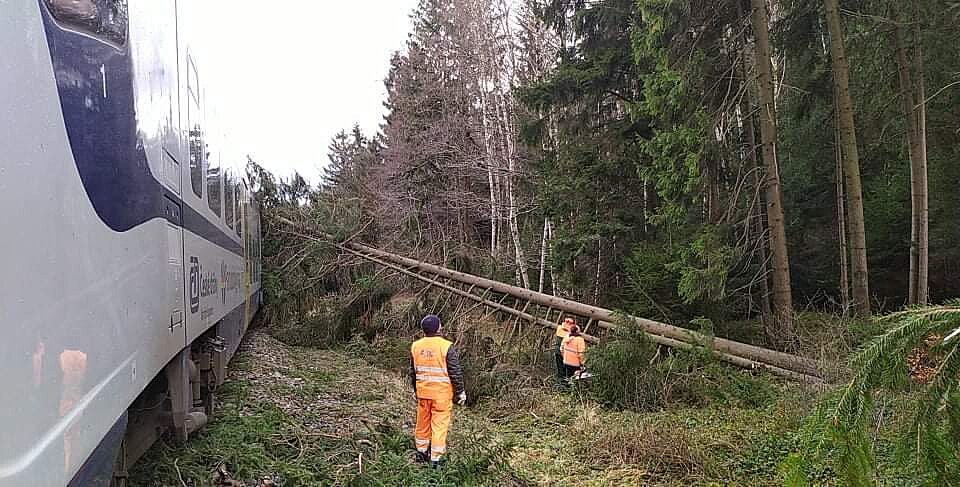

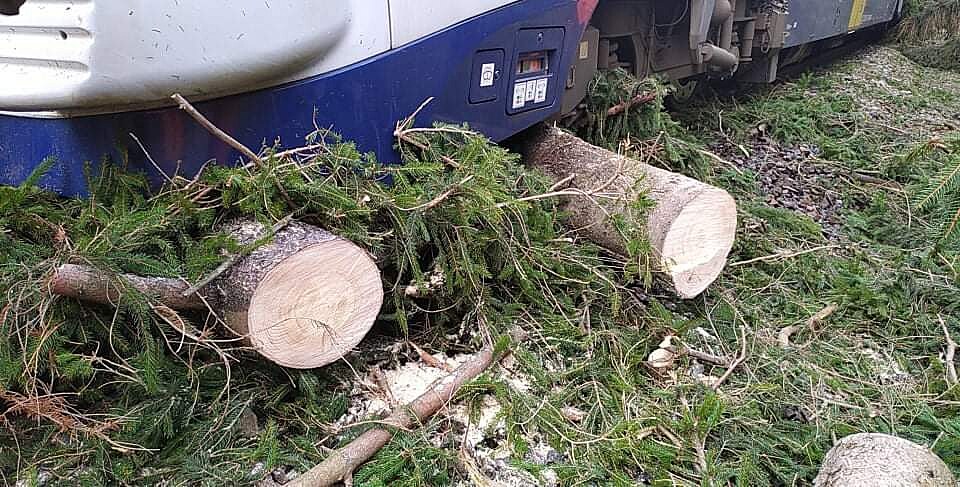
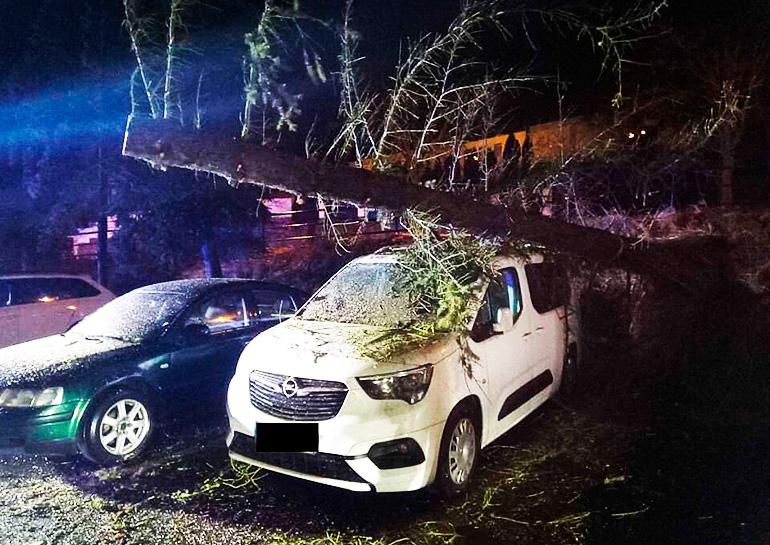
More than a dozen countries have urged their citizens to leave Ukraine amid warnings from Western powers that an invasion by Russia could be imminent.
The US, UK, Germany and the Czech Republic are among those who told their nationals to leave.
The last family members of the diplomats at the Czech Embassy in Kiev will leave the town on Sunday afternoon and evening. The embassy will continue to operate with 29 people remaining there.
On Saturday, the Ministry of Foreign Affairs announced the withdrawal of the diplomat’s family members from the country. The Ministry also recommended Czechs who are in Ukraine to leave the country.
Canada is also moving its embassy staff to Lviv, near the border with Poland.
Australia, Italy, Israel, the Netherlands and Japan have told their citizens to leave Ukraine. Some have also evacuated diplomatic staff and their families.
The Kremlin described the call as taking place amid “peak hysteria” from the US and its allies, and said Mr. Putin had again told his counterpart that they had not addressed Russia’s security concerns. But both leaders would continue to talk, it said.
Moscow has amassed an estimated 100,000 troops along Ukraine’s border but denies any intent to invade.
In a phone call, US President Joe Biden again warned Russian leader Vladimir Putin of the costs of any invasion.
For his part, Ukrainian President Volodymyr Zelensky said invasion warnings could stoke panic, which he called “the best friend of our enemies”.
The White House has warned that an invasion could happen at any time, and could begin with bombing from the air. Russia characterised such allegations as “provocative speculation”.
Fertility problems are common; one in six heterosexual couples worldwide experiences some form of infertility problem at least once. The Czech Republic is a desirable destination for all methods of IVF (In vitro fertilisationtreatments.
The average cost in Czech Republic for IVF is between €2,700 and €5,700, with donors’ eggs between €4,500 and €8,000. In comparison, the price of IVF in the UK can hit a maximum of €10,000 and €14,000 respectively.
Czech IVF clinics are also amongst the best in Europe in terms of success rates. According to a 2014 report from the European Society of Human Reproduction and Embryology (ESHRE), the average birth rate for IVF using the patient’s own eggs was around 33 per cent for those under 35 years old, 25.4 per cent for patients aged 35-39 and 13.2 per cent for patients over 40.
The average birth rate for IVF treatment with donor eggs was higher, at 46.8% for all age groups. As well as the traditional IVF, there’s also the option to pursue ‘social freezing’, a relatively new treatment designed to freeze eggs or sperm at the peak of your fertility.
After collection, the gametes are cryopreserved until the owner is ready to start a family. It’s possible to do this for years.
The Human assisted reproduction legislation in Czech Republic is one of the most liberal ones in Europe, perhaps worldwide.
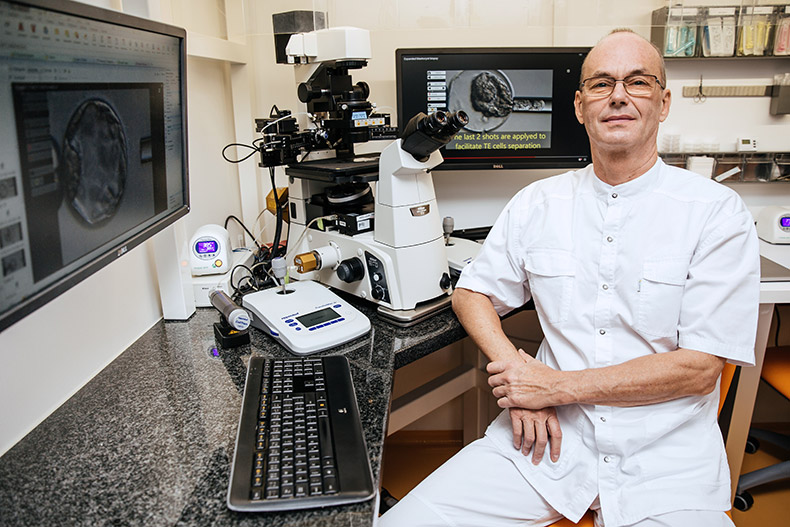
Dr. Hlinka
The Czech law allows for properly tested people to donate their gametes. So, from anonymous reproductive cells donation programs to advanced genetic testing, couples that have depleted every treatment possibility at home can find adequate help at centres like PFC, Prague Fertility Centre, a well-known private clinic based in Vysočany, founded 11 years ago by Dr. Sonja Lazarovska, a gynaecologist and Dr. Daniel Hlinka, an embryologist; esteemed specialists who have both made significant contributions to the field.
“We have seen the market evolve for the past 25 years. We are opening a completely new floor with modern facilities and state of the art Lab in 2021. We will offer better comfort and privacy to our patients, as well as increased treatment capacity. We will be able to help twice as many couples as we do today„ said Dr. Hlinka.
Coronavirus related restrictions have changed the way that fertility treatments are carried out. But they are still safe to do. Prague Fertility Centre has adapted to the situation by offering online consultations, which as well as talking through treatment options, provides information for donors and guidance for women self-injecting hormones at home in preparation for egg collection and fertilisation.
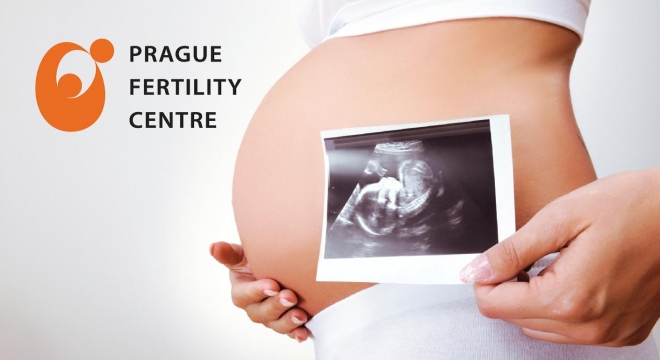
This process, known as hormonal stimulation, is a key part of IVF, and so women are encouraged to self-isolate when doing so, as planning a pregnancy, even when doing so naturally, already means taking extra preventive measures to avoid getting the virus.
“The ever-changing Coronavirus situation has led us to require a negative covid test before starting any treatment, this is in the best interest of our patients, a healthy pregnancy, and of course, of our staff. We would like to assure all our patients that there is no evidence about IVF increasing the risk of infection. With regards to Covid-safe facilities, PFC has upped the intensity of our usual cleaning regime, implemented mask-wearing, hand sanitising, and temperature checks at reception,” said Dr. Lazarovska.
“We have also increased the number of online consultations to reduce the number of people visiting us. Since we opened the Centre, online consultations have always saved our patients’ travel time and expenses, while still provided all the necessary medical help,” she adds.
“When Coronavirus first hit, a lot of people felt it was not the right time to start a family, but as the world seems to have learned to ‘live with the virus’, people have decided not to postpone their family plans any longer. Meanwhile, our single clients have decided to freeze their eggs or sperm while they are healthy and fertile. Explained Dr. Svabikova, the Centre’s Senior IVF physician, dedicated to helping German and English speaking patients.

When asked about Brexit and how it would affect the travel of UK citizens for IVF treatment after January 1st, 2021, Dr. Svabikova commented: “We don’t foresee any complications. Except for queuing in a separate lane at border control, all our British patients will continue to receive treatment like before”.
An estimated 9 million babies have been born through in-vitro fertilization (IVF) since 1978, and the popularity of the treatment shows no sign of slowing down.
So while fertility treatments are closed off to many, a couple struggling to start a family will find endless commitment and support at PFC “We will not make false promises, but we will fully commit, from day one, to help all our patients achieve a healthy baby” said Dr. Svabikova.
Lucia Janovcová and Korena Flanagan have no problem giving Covid the finger. The two marketing and communication specialists launched a service to provide free advice for businesses impacted by the pandemic. To make the message crystal clear – they called it F_CK COVID.
“We called it fuckcovid because that really is how everyone is feeling – especially if you have your own business,” co-founder Lucia Janovcová explained.
Once small businesses register for free, they’ll have access to a remote marketing and communications session, help getting started on a plan, and be featured on the site’s Buy Local page.
The pair want to provide fresh ideas for businesses struggling to manage this uncertainty to give them back some control. Janovcová said the idea came from the frustration of isolation: “Like everyone we are sick of this disease. We are sick of being locked up and we are sick of people not wearing masks and washing their hands,” she said.
“We had a choice – get angry on the couch or do something to help. So we started this service.
Janovcová said she often gets asked why they are offering the service for free. “The answer is pretty simple – to give COVID the finger. We are all suffering and it sucks. If we can help businesses recover from this horrible pandemic then we have kicked 2020´s butt.
“We are encouraging other services to help out as well. If you are an expert and you can help out another business – join the movement and help us give COVID the finger.”
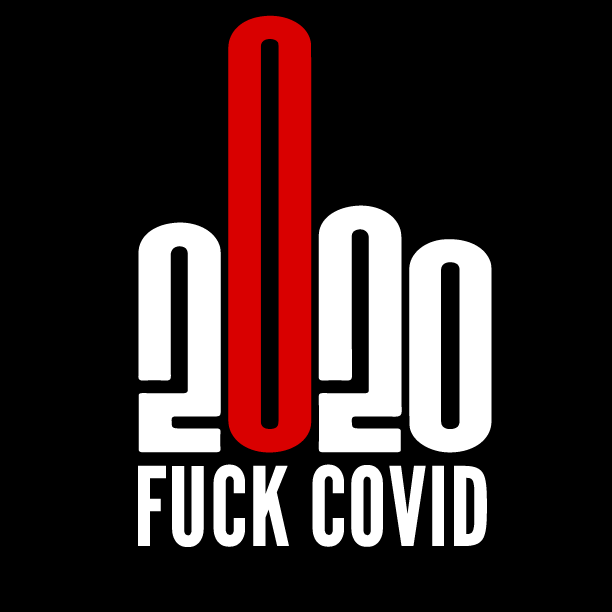
Slovakian born Janovcová works in event marketing. She previously handled partnership development with businesses in Asia and Europe, including the Hong Kong Trade Development Council. She wants to give some of her knowledge back to help people weather the crisis, along with her friend Korena Flanagan.
Flanagan is a communications consultant with a background in political strategy and communication. She was once the strategy advisor to Australia’s first female Prime Minister.
“The response has been incredible. We are helping all kinds of businesses from start-up retailers to established brands from across Europe and the UK,” she explains.
“This is our own small act of defiance against this horrible disease that is trying to kill us and our businesses.”
Nevada is ripe with many different business opportunities and ventures, and entrepreneurs are free to utilize this to their advantage. Thanks to the nature of LLC formations, it is simple to create a small business in Nevada, and many benefits are associated with such a business entity. Read more about LLC formations in Nevada to learn about the requirement details.
The Czech Republic will use more fossil fuels as a power source over the next decade than the majority of the EU, a new report has revealed.
Think Tank Ember has analysed energy plans submitted by all 27 European Union member states. These documents, which were submitted to the European Commission for approval, detailed how the country expected to produce electricity by 2030. The Czech Republic submitted theirs in January 2020 after the material was approved by the government. The results don’t look good – Poland is the only country that uses more coal than Czechia.
In 2030, coal, the fossil fuel which emits the most CO 2, will still account for at least a third of total electricity production in Bulgaria, Czechia and Poland (considerably more in Poland).
The 2020’s is a crucial time for climate change action. To meet the EU’s commitments under the Paris Agreement — which aims to limit global temperature rise to 1.5°C — all EU countries need to phase out coal by 2030. However, the report shows that Czechia is far from achieving these goals. Approximately 90% of the remaining electricity generation from coal is expected to be from just three countries, Germany, Poland, and the Czech Republic.
Czechia also has the worst green energy commitment. The country plans to convert less than 5% of its power output to solar and wind by 2030. Meanwhile, the Netherlands plans to replace over 60% of its current electricity supply.
Eastern Europe generally performs below average. Czech Republic, Poland, Slovakia, Hungary, and Bulgaria produced the least amount of bioenergy in 2018, and this trend is set to continue. The use of renewables is slowing down in Czechia, Romania, and Bulgaria despite the cost of solar and wind energy falling over recent years.
In light of this damming report, Czechia’s Minister of Industry and Trade, Karel Havlíček, hit back, telling Deník N that the Czech plan is, on the contrary, ambitious.
